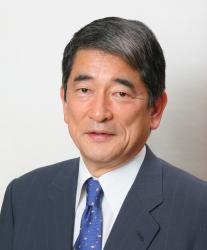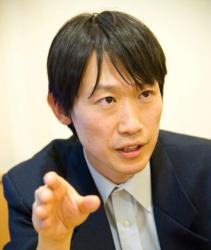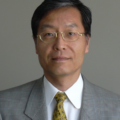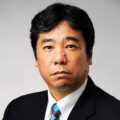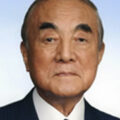HOPE FOR JAPAN OR U.S. CONSPIRACY?
Hosaka Masayoshi: I personally have not yet made up my mind whether to support the TPP. If I’m not mistaken, Nakano-san is basically against it and Okamoto-san is for it.
Nakano Takeshi: So far, I have turned down offers to directly debate with people who support the TPP because arguments tend to get emotional and unproductive. But I don’t insist that my arguments are perfectly correct. Without trying to flatter you both, I thought that we could hold a meaningful discussion.
The national government has already declared that Japan will participate in the TPP negotiations, but I don’t think we should, for two reasons.
First, the advantages asserted by the government are unfounded, while the anticipated disadvantages are numerous. Second, things have proceeded before arguments have matured.
Okamoto Yukio: I believe Japan should at least take part in TPP negotiations since things are decided through negotiations. Failing to do so might lead to establishment of rules that are extremely disadvantageous for our country. In time, a huge economic region called the Free Trade Area of Asia-Pacific (FTAAP) is set to emerge.
Nakano: I know that not all economic partnership agreements are bad. But the TPP is especially awful, and that is why I think Japan should refuse it.
Hosaka: I have looked at the issue from historical viewpoints, and my impression is that the imperialistic method of Americans is not easily eradicated. Generally speaking, the sort of vulgar nature of American imperialism is again at work here, forcing all members to accept its self-centered rules. And this is the point I’m concerned about.
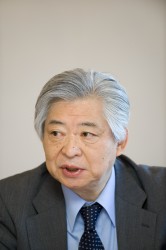
Hosaka Masayasu
?Bungeishunju Ltd
Is there only a choice between the United States and China?
Okamoto Yukio
Okamoto: I was involved with the Tokyo Round of the GATT negotiations in 1971, and it is true that the United States will act in an overbearing manner in one way or another.
Hosaka: And Japan has assumed quite an ambiguous stance in diplomatic relations with the United States. We don’t need to assume a fighting stance, but among politicians, citizens, and the newspaper media, none have thought over and sorted out Japan’s interests. This is why arguments tend to get haphazard regarding whether to be for it or against it.
Nakano: Even now, arguments have been simplified as to whether to side with the TPP led by the United States or ASEAN+3 led by China. If Japan were asked which it would choose, anyone would think it would side with the United States. [Laughter] But the meaning of leadership differs completely between the United States leading the TPP and China leading ASEAN+3.
Hosaka: How is it different?
Nakano: I feel the same way as Mr. Hosaka about the rude leadership of the United States, which seeks to unify the rules to create situations lucrative for itself. ASEAN+3, however, is still in the planning phase, even though China has made a lot of noise sloganeering. Domestic systems are diverse among different countries, and tariffs are still being imposed. There are also security issues such as the Spratly Islands. Things are not going that smoothly, and we can see that the definition of “leadership” differs. ASEAN+3 would be an extremely loose organization even if it were actually established. And even if Japan participated, China would not, for instance, force its intellectual property rights system to be adopted. On the other hand, the TPP is a lot more radical, and large conflicts would arise sooner or later involving the United States intellectual property rights system, medical insurance system, pharmaceutical products system, and so on.
Okamoto: In the 1980s, the United States launched a tripartite attack involving the growth of domestic demand, foreign exchange and market opening, against overwhelmingly large volumes of Japanese exports. The United States took a forceful attitude at that time as well. In the final negotiations on automobiles between the two nations, the United States even demanded reorganization of keiretsu (affiliated corporate groups). But looking back on this, I wonder whether there was such a fierce conflict rising in Japan when those negotiations started as there is with this case.
Nakano: I don’t believe there was.
Okamoto: At the time of the Uruguay Round, conflicts arose in the final phase, but not before starting negotiations. In this regard, the current situations are similar to those during the Japan-U.S. Security Treaty negotiations. Looking at the provisions, I doubt if the situation was serious enough to make 300,000 people demonstrate around the National Diet building. In any case, it’s been proven that Prime Minister Kishi was right in choosing to conclude the Security Treaty. To me, the TPP seems similar to that case because the issue has caused a disproportionately heated reaction within Japan.
At any rate, Japan has held its ground in negotiations since the Kennedy Round, against the unreasonable demands of the United States. Japan has had its say in most cases, including the correction of the investment-savings (IS) balance, governmental procurements and the Super 301 provisions of the Omnibus Trade and Competitiveness Act of 1988. So, this time as well, we can meet fire with fire. Japan should achieve its objectives through a sequence of bargaining in negotiations.
Nakano: But Japan does not need to join the TPP to take part in the regional economic area led by the United States. In fact, Japan has already concluded economic partnership agreements (EPAs) with six of the nine countries participating in the TPP negotiations, and studies are underway for doing so with Australia. If Mexico was to join the TPP, Japan has already concluded an EPA with it. No EPA has been concluded with the United States yet, but free trade has been realized between the two countries; so Japan has already been incorporated in the United States-led economic area. This being the case, Japan only needs to discuss whether the TPP itself brings benefits to our country, rather than debating over choosing between the United States and China.
Okamoto: But it would become complicated and confusing if we kept on concluding bilateral free trade agreements (FTAs) and EPAs one after another. This is called the spaghetti bowl syndrome. Spaghetti gets tangled up when it’s stirred. For example, even if we tried to remove tariffs based on rules of origin, things would get complicated because products these days are made of components from numerous countries. In this regard, it’s meaningful to organize multiple countries under one rule.
President Obama in transition
Nakano Takeshi
Hosaka: Thinking about the TPP’s origins, it is like a major league baseball player dropping by at a minor league team saying he wants to raise the team’s level to major league. I sense similar pushiness in the United States. The situation is indicative of its strategic direction in the twenty-first century. To compete with this aggressiveness, Japan needs to possess solid views on the history and develop strategies and tactics. But Japan seems like it started hurriedly arguing about a year ago. I can’t help thinking Japan is about to start negotiations without strategies, swept away by the pace of the United States.
Okamoto: It’s true that arguments haven’t matured at all. This is why conflicts are arising where they aren’t necessary. The government is greatly responsible because it never properly provided information.
Concerning the TPP’s origin, there is a paper by U.S. Secretary of State Hillary Clinton that says that from now on the United States will move beyond Iraq and Afghanistan and place the top priority on the Asia-Pacific region. In other words, the United States is making inroads into Asia-Pacific, where there is great potential for economic benefit. The United States has indicated that as part of the process it will maintain ongoing alliances, but also desires to update them. What’s more disappointing about that paper is it says the three giants should closely deliberate over the Asia-Pacific’s future.
Hosaka: By “three giants” you mean Japan, China and…?
Okamoto: Believe it or not, it’s the United States, China, and India. The paper also refers to India and Indonesia a great deal, but says almost nothing on North Korea and Taiwan. Some points in that paper are irritating for Japan, but it’s not bad for Japan that the United States’ strategic weight is shifting to the Asia-Pacific region.
Hosaka: The United States must be shifting its strategies to Asia because its conventional industrial structure has collapsed and as a solution it’s seeking a vehicle for getting its way in Asia. In the past several decades, the manufacturing industries of the United States’ industrial structure have almost completely been destroyed, and today financial services are the mainstay of the economic structure. The United States must believe Asia offers a vessel for imposing the will of financial capital.
Okamoto: Yes, the financial capitalism of the United States has been transformed, as you said, and its people have not yet been able to find a replacement for it. But I’m sure the United States will revive. The country went through some hard times after the Vietnam War ended in 1975, but it recovered dramatically in the 1990s, and again reigned over the world economy. And now, President Obama announced a grand plan to reduce financial deficits by three trillion dollars over ten years. Three trillion dollars is equivalent to the amount spent on the wars in Afghanistan and Iraq, and for counterterrorism measures. In other words, the United States’ economy would have been in pretty good shape if there had been no war in the Middle East. The armed forces will withdraw from Afghanistan by 2014, and it won’t take more than fifteen years for the country to get back on its feet.
Hosaka: Is that true? Where can we find the reasons for this?
Okamoto: The greatest reason is because its population continues to grow. The potential for economic growth is brought about by the growth in productivity and population. Since the productivity has started leveling off among countries in this IT era, areas where population is likely to grow have potential. Some time ago, I recall the U.S. population being 260 million. Japan’s is 130 million, so the ratio is 2:1. In 2050, however, the United States population is estimated to reach 450 million, while Japan’s is expected to be 93 million. This means a widening gap of up to 4.5:1. If the superpower United States is to grow so huge in population terms, I think Japan has no choice but to pursue economic activities together with the United States.
Nakano: To be honest, the United States is not consistent. Today, Wall Street has taken over Washington. On the other hand, most ordinary citizens do not even know the TPP exists. The TPP is being argued for because special interests in the insurance and agricultural industries lobbied in many ways prior to the presidential election, and are throwing their demands onto other countries.
Regarding the origin of the TPP that Mr. Hosaka mentioned, President Obama was critical of the North American Free Trade Agreement (NAFTA) and other trade agreements similar to the TPP while campaigning for office. He was elected because of support by liberal groups, and took office after the collapse of Lehman Brothers. He tried to correct the gap between the rich and poor and adopt the national health insurance system, but failed. His support rate dropped and he was completely swept away by Wall Street. The TPP suddenly emerged as part of the strategy to double U.S. exports.
Hosaka: Liberal groups in the United States are greatly disappointed with Obama. They are angry not only about the rise in the unemployment rate, but also about the skewed distribution of wealth brought about by financial groups and stagnant exports.
Nakano: Free trade seems mutually beneficial, but when the global economy is shrinking rapidly as in the days immediately following the Lehman Brothers collapse, free trade simply results in competition over employment opportunities. In fact, President Obama never mentioned free trade in his State of the Union address in 2011. He only stated the United States would export more and increase employment opportunities by such-and-such a rate. This is a typical beggar-thy-neighbor policy. Increasing employment opportunities in one’s country by increasing exports is nothing more than stripping away the partner country’s employment opportunities.
It’s nice if the double-exports strategy of Obama actually increases employment opportunities for the American people (the export of services has tripled), but the working class and middle class won’t profit because manufacturing has collapsed. Thirty percent of U.S. exports consist of services, in the areas of medicine, insurance, and consulting. It’s a world of highly educated elites. Employment opportunities will not increase in agriculture either, because the major companies like Cargill and ADM will take control. So, even if exports doubled, it’s the wealthy class, which only account for a few percent of the population, who take a lion’s share of the profits. As the Bible says, the rich get richer (Matthew); and this is increasingly the case with the President’s policy.
Okamoto: The fundamental difference between Mr. Nakano’s and my views concern whether it is better to close the market when the economy is stagnating. It’s true to some degree that there will be competition over employment opportunities if we open the market in this environment, but it’s also a fact that in Japan the contribution ratio by exports to last year’s GDP is as high as 37%. In a recession, Japan has somehow secured profits by exports. Well, in that process, Japan may have snatched away profits that other countries deserved. At any rate, structural reforms need to be implemented under the current economic situation so that we can deal with the situation even if Japan is inundated with imports. It doesn’t seem appropriate to me to close doors to liberalization when the economy is hurting.
Tariffs are not longer a point of issue?
Hosaka: Let’s set aside U.S. intentions for a while. What about your personal views on the TPP itself? From my viewpoint, the direction for establishing a global market concerning the intellectual property rights issue doesn’t seem bad.
Nakano: It’s been said that there are now twenty-one areas of the TPP, and tariffs are imposed only in one of them. The Japanese people have discussed tariffs on agricultural products in the past year almost exclusively, but U.S. ambitions lie in the remaining twenty.
What is the decisive difference between the TPP and a conventional economic partnership? For Mr. Okamoto who was involved with the Tokyo Round, I might sound like I’m preaching to the choir, but the major tariffs were already lowered significantly by the time the Kennedy Round closed in 1967, and from that point on nontariff barriers came into focus. Serving as a backdrop to this was the arrival of an age in which Japanese companies could win if they competed with the world fairly after eliminating tariffs. The world has been forced to accept domestic systems that are convenient for the United States, in the name of nontariff barrier elimination. This is what globalization is all about. A good example of this is South Korea. Through the United States-Korea Free Trade Agreement (KORUS FTA), South Korea was forced to dissolve mutual aid systems to go along with U.S. standards regarding automotive emissions restrictions, and accommodate all U.S. demands concerning medical and pharmaceutical products, intellectual property rights, and so on.
Okamoto: The South Korean side first proposed the KORUS FTA. President Lee Myung-bak is happy, saying that the market for the South Korean goods has expanded to cover the United States and the European Union. He must be thinking about securing a competitive edge over Japan. In fact, South Korean products have beaten Japan’s. In India, 80% of electrical products came from South Korean companies, and Japanese and European companies share the remaining 20%. In Brazil, 60% of products came from South Korea. In the EU as well, South Korea has advantages in tariff rates over Japan by 10% with automobiles and 14% with electrical appliances. Japanese products are on the verge of extinction.
Nakano: The International Monetary Fund (IMF) thoroughly revamped South Korea as a result of the currency crisis in the late-1990s. For this reason, South Korea and the United States have very similar economic structures. And the Americanized economy of South Korea is of the same structure as that of the United States, where the people are unhappy while President Lee Myung-bak, Samsung, and LG feel fine.
To be honest, Japan is on a similar track, and there is a gap between what the government and business leaders have in mind and what ordinary citizens have in mind. Prior to globalization, happiness for business leaders meant happiness for ordinary people. But since globalization, the profits of major companies and those of citizens no longer coincide. I don’t want to speak poorly about the ministry I used to work with, but the Ministry of Economy, Trade and Industry has maintained the same views as in the past, and still believes that by expanding profits of companies through exports, the citizens will be happier.
Hosaka: South Korea abandoned agriculture, but arguments on agricultural crises are still being repeated in Japan. We should think about why agriculture has always been a loser, and the government should consider why its measures to protect and nurture agriculture have not worked. However, the only argument being heard is that by liberalizing agriculture, the food self-sufficiency rate of Japan will decline. We need to have determination and preparedness to live in this society at this time, but such arguments are rarely heard.
Okamoto: We should start thinking about exporting agricultural products as well. The population of Japan will continue declining, and people will be eating less as they age. Domestic markets will resultantly get smaller and smaller. The situation is exactly the opposite to that of other countries, in which the number of hungry young people will continue to grow. Under these circumstances, rice made in Japan will be very competitive. Tasty Japonica rice will enjoy popularity in any country. A decade ago, the price difference of rice between Japan and China was 6.6 times, but this has narrowed to 1.3 times. This being the case, rice produced in Japan will be competitive.
Participating requires U.S. Congress approval?
Hosaka: I’m half hopeful and half disappointed about the Noda administration. There was a minor “he said, she said” dispute with the United States. In diplomatic negotiations, the United States always states the basic principles clearly and then utilizes a range of tactics. The same applies to Cordell Hull’s four principles indicated in negotiations prior to the outbreak of the Pacific War. Japan was unable to deal with the negotiations and was exhausted, because it never accurately understood the points. In the end, Japan resorted to the surprise attack and the war started. Similarly, Prime Minister Noda seems confused because he hasn’t truly gotten the basic principles.
Nakano: Honestly, it could already be too late for Japan to participate in the TPP negotiations. The Tokyo Shimbun newspaper reported that in order for Japan to participate in the negotiations, the approval of other member countries, and especially the United States Congress, is necessary. Examination takes ninety days, so even if Japan declared it would participate in the negotiations, it could actually join only around May, if prior meetings were also held. On the other hand, the TPP rules will be established by the summer, so Japan would barely have any time to participate in the rulemaking.
Hosaka: The game was over before Japan stepped into the arena.
Nakano: Moreover, discussions have not progressed at all in Japan. Over 1,100 local assemblies have resolved they are against the TPP or that careful studies are needed. Only six governors came out in favor of the TPP. Opinion surveys showed that 80% of the public is uncertain about the TPP. Among the minor parties, Your Party is the only one that indicated support. Among the major parties, the Kokumin Shinto Party and New Party Nippon are against it, and even the Democratic Party of Japan concluded that prudent judgment is needed. In total, Japan’s democracy has clearly stated its opposition to the TPP. Despite this situation, the Prime Minister declared that Japan is participating in the negotiations.
On a formal level this is forgiven. Item 2 of Article 73 of the Constitution says that the Cabinet is solely authorized to process diplomatic matters. What concerns me is that even though the Diet of Japan cannot control the declaration to participate in the TPP negotiations, U.S. Congress approval is required. Isn’t that unfair?
Hosaka: If it’s not happy with the TPP, the Diet can refuse to ratify it.
Nakano: Yes, of course, but there’s also a problem there. Just as with budgets, resolution on a treaty by the House of Representatives takes precedence over that by the House of Councilors, if they differ. Yet if it was decided in the TPP to revise or abolish non-tariff barriers, the domestic systems and laws of Japan need to be changed accordingly. Both Houses need to make a resolution when establishing a law in Japan. However, Japan’s laws may be revised or abolished only by a resolution of the House of Representatives if they are for enforcing a treaty.
Hosaka: Why have things gotten so complicated?
Nakano: I think it’s because the Constitution’s provision saying that the Cabinet is solely authorized to process diplomatic relations was established prior to the economic globalization we see today. People like Professor Jane Kelsey of New Zealand and Emmanuel Todd of France are against free trade and globalization because they feel that they could destroy democracy. They say the key point of democracy is that the fate of a nation is to be decided by its citizens, and this gets blocked.
Okamoto: You do have a point. It makes me also wonder why Japan needs approval from the United States Congress. But it’s also true that some in the United States strongly oppose Japan’s participation in the TPP. Seen conversely, they do so because they think Japan will benefit by participating. Moreover, those opposing Japan’s participation, such as U.S. agricultural organizations, are not consistent in their views. In short, we never know from where the opposition will come.
Hosaka: That being the case, negotiations will be extremely tough.
Okamoto: I agree. However, Japan and the United States have become entirely familiar with each other’s cards through the Structural Impediments Initiative (SII) and other such experiences. Among the TPP’s principles are not discriminating between domestic and foreign enterprises and giving any partner country most-favored-nation treatment. As such, it is unlikely that anyone will force Japan to make unreasonable concessions. Well, I might be too optimistic about this. I should note that unlike the negotiations for the past four rounds, no secretariat has been established this time.
Nakano: That’s true.
Okamoto: There is no mediator. The negotiations will ultimately be with the United States Trade Representative (USTR). At any rate, with domestic opinion split, negotiators will have an incredibly hard time.
Nakano: There are two difficult aspects to the negotiations. One is that all other participating countries could target Japan. They are all are tackling economic hardship and have no choice but to latch on to external demand. Japan is still the world’s third-ranked GDP, though it has fallen one rank, and domestic demand is larger in Japan than in China. Under this situation, Japan would be the only lucrative target. Some are happy that since Japan declared its participation in the TPP negotiations, China, as well as Canada and Mexico started action. It’s natural for them to start moving because if Japan is willing to negotiate on liberalization of all goods and services, these countries will be more than happy to get them. [Laughter]
Another problem is with the mindset of the bureaucrats in charge of the negotiations. Japanese politicians who were bureaucrats until very recently, and critics who support the TPP, have made comments on TV that only external pressure can change Japan. If bureaucrats are attending sessions with such a mindset, there is no chance for them to negotiate effectively with other countries.
Hosaka: Former Prime Minister Ito Hirobumi (1841-1909) and former Foreign Minister Mutsu Munemitsu (1844-1897) resolutely returned the Liaodong Peninsula as a result of intervention in 1895 by France and the German and Russian Empires. Former Foreign Minister Komura Jutaro (1855-1911) bravely concluded the Portsmouth Treaty. Such politicians are not found in Japan these days. Former Prime Minister Kan Naoto is greatly responsible since his comments about the third opening up of the country prevented the TPP issue from being resolved for such a long time.
Okamoto: We have no one in history like Kan. [Laughter] Perhaps Tanaka Giichi (1864-1929) is his equal in damaging Japan’s national interests so badly. Well, maybe I’m being too harsh. Hatoyama Yukio (former Prime Minister) was like Konoe Fumimaro (1891-1945), who was unable to maintain a resolute attitude and caused the Sino-Japanese War to spread. I hope Noda will be a Prime Minister like Hamaguchi Osachi (1870-1931).
Hosaka: In hopes of encouraging him, I would like to ask Noda if he intends to work as hard and effectively as Prime Minister Shigeru Yoshida, who helped Japan recover from the damage of World War II.
Nakano: I don’t think an issue like the TPP can be found in Japan’s history. No country is exerting military force, but Japan is making moves at its own initiative without fully discussing the issue. The treaty is being launched by the United States, which has been hurt. Japan can never recover if such a treaty is concluded without a great deal of consideration. Japan was much more serious about diplomatic negotiations in the past. It’s disrespectful for us to try to find similar examples in history.
What became of the complaints by the poor?
Hosaka: About the Americanized South Korea mentioned earlier, a South Korean friend of mine said that society itself has faced difficult situations. People are leaving the country one after another, to the United States, Australia, and elsewhere. The problem here is that the same tendency is found in countries other than South Korea as well. In Germany and the United Kingdom, many young people aged fifteen to sixteen and around twenty have started working without going to school, because it enables them to somehow get by. Financial capitalism has made it possible for people to make a living, though at a minimum level, and the number of people who have never tried to study hard is increasing.
It surprised me that there are in fact clerks who are illiterate or cannot add figures. This is a social phenomenon ultimately brought about by specialized financial capitalism. Before long, the number of such people will increase in Japan as well, occupy a mass of society and start violently making social demands, the number of people committing suicide might increase and various other phenomena could emerge. There is a political risk in that we do not know what sort of faction these people will form. We are no longer in a stage where we should talk about a safety net.
Nakano: No, we are not at that stage anymore.
Hosaka: I wouldn’t say the TPP is to blame for all phenomena, but it is a fact that the TPP would accelerate the situation.
Nakano: The Occupy Wall Street movement and anti-TPP movement are closely related.
Today, Japanese people see demonstrations on Wall Street on TV, as well as the crisis in the European Union. We have witnessed a huge turnaround in our times since the Lehman Brothers collapse in 2008. As such, we are mistakenly perceiving these times if we witness the collapse of financial capitalism and the end of globalization on one side while supporting the TPP that is a residue of it.
Okamoto: It’s exactly as you say about the risks of globalization. Under the present circumstances in the eurozone, European banks will soon withdraw the $3 trillion they have lent to developing countries. Both Brazil and China will be affected greatly. The United States has not been able to achieve a recovery in household accounts from the collapse of financial capitalism. Is it appropriate to pursue the TPP in such times? I think Japan should not remain aloof at times like these. It’s too late if Japan joins free trade areas like the FTAAP after rules that are disadvantageous to the country are established. We have no choice but to go along and launch counterattacks here and there in the process.
What causes does the TPP uphold?
Nakano: So then what are the TPP’s causes? When the Okinawa islands were returned to Japan at the sacrifice of the fiber industry, the people said we sold thread and bought rope (nawa). There are times when we are forced to make difficult decisions knowing that some people will be cast adrift. That’s what diplomacy is all about. What causes does the TPP uphold?
Hosaka: One is that it would serve as a sort of insurance for the future, before it’s too late, as mentioned earlier. Isn’t this what is implied?
Nakano: That’s not persuasive enough. Japan is facing a national crisis caused by the earthquake. There are many farmers in the affected areas and they all oppose the TPP. But the debates over the TPP that suddenly arose made it sound as if no earthquake had taken place. This is not normal. Participating without persuasiveness or cause is one of the country’s most abnormal and thoughtless diplomatic decisions in its post-World War II history. This action seems incredibly insensitive in view of the serious situations of these times.
Okamoto: I know those negotiating are working hard, but it’s not certain whether the Diet will ratify the packages they prepared. As stated at the start of this talk, the contents are decided only through negotiations.
Even though our opinions differ, I think Mr. Nakano’s remarks have been very perceptive. The TPP must properly respond to his criticisms.
A difficult point is that even if the rulemaking that would end up at, say, a -10 level if pursued without Japan was improved to -3 with Japan’s participation, the agreement would still be rated negatively. On the other hand, it’s natural for the TPP to be criticized while the Noda Cabinet is in office because the objective of revitalizing trade is still ten years away.
Hosaka: This relates to the thoughtlessness mentioned by Mr. Nakano, but everyone seems to only be viewing things at the surface level. The TPP demands that we discern what sort of an age we are living in.
Following March 11, an American scholar who experienced the Vietnam War told me: “We went through all sorts of hardships in Vietnam. We know what sorts of brutal facts accompany wars. But what I see on TV with this disaster is even worse. Mr. Hosaka, what words of condolence can I possibly utter?”
I was so taken aback to hear his words. It tells me we are not seeing what they are seeing. Similarly with the TPP, there must be aspects we have seen and those we haven’t. We are at a time when we need to reach the deeply hidden aspects and decide what path we should take for our future.
Translated from “TPP Daironso joi vs. kaikoku (the Great TPP Debate: Maintaining Anti-Foreign Policy or Opening up the Country?), ‘Nihon no kibo ka Beikoku no inbo ka’ –Kokuron wo nibunsita TPP mondai. Sanka de Nihon ha do kawaruka?,” Bungeishunju, January 2012, pp. 144-154. (Courtesy of Bungeishunju Ltd.)
